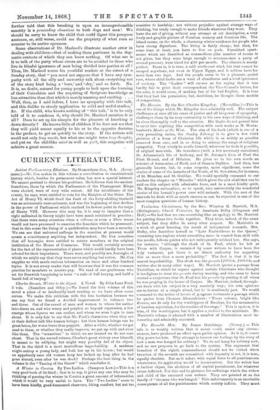CURRENT LITERATURE.
Antient Parliamentary Elections. By Homorsham Cox, M.A. (Long- mans.)—Mr. Cox makes in this volume a contribution to constitutional history which, besides its permanent value, has now a special interest. We cannot pretend to discuss his positions. Ho believes that the ancient franchises, those by which the Parliaments of the Plantagenet Kings wore elected, were of very wide extent. All the inhabitants of tho county, he says, wore entitled to vote for the Knights of the Shiro. Tho Act of Henry VI. which fixed the limit of tho forty-shilling freehold was an aristocratic encroachment, and was the beginning of that decline in the power of Parliament which reached its lowest point in the reign of Henry VIII. However this may be, it is easy to imagine that a right unlimited in theory might have been much restricted in practice ; that there were many occasions when a vi/lanes or even a libere tenens would not have presumed to exercise the franchise which ho possessed; that in this sense the fixing of a qualification may have been a security. We can see that universal suffrage in the counties at present would create a constituency anything but independent. Mr. Cox considers that all boroughs were entitled to return members at the original institution of the House of Commons. This would certainly account for the fact of the representation of places which could hardly have been selected for their importance. There were, and possibly are, boroughs of which we might say that they were never anything but rotten. Mr. Cox supplies us with much curious information on these and other kindred topics. It is not every reader that will be aware that it was the common practice for members to receive pay. Wo read of one gentleman who sat for Dunwich bargaining to have " a cade of full heryng, and halff a baron full of heryng."


































 Previous page
Previous page